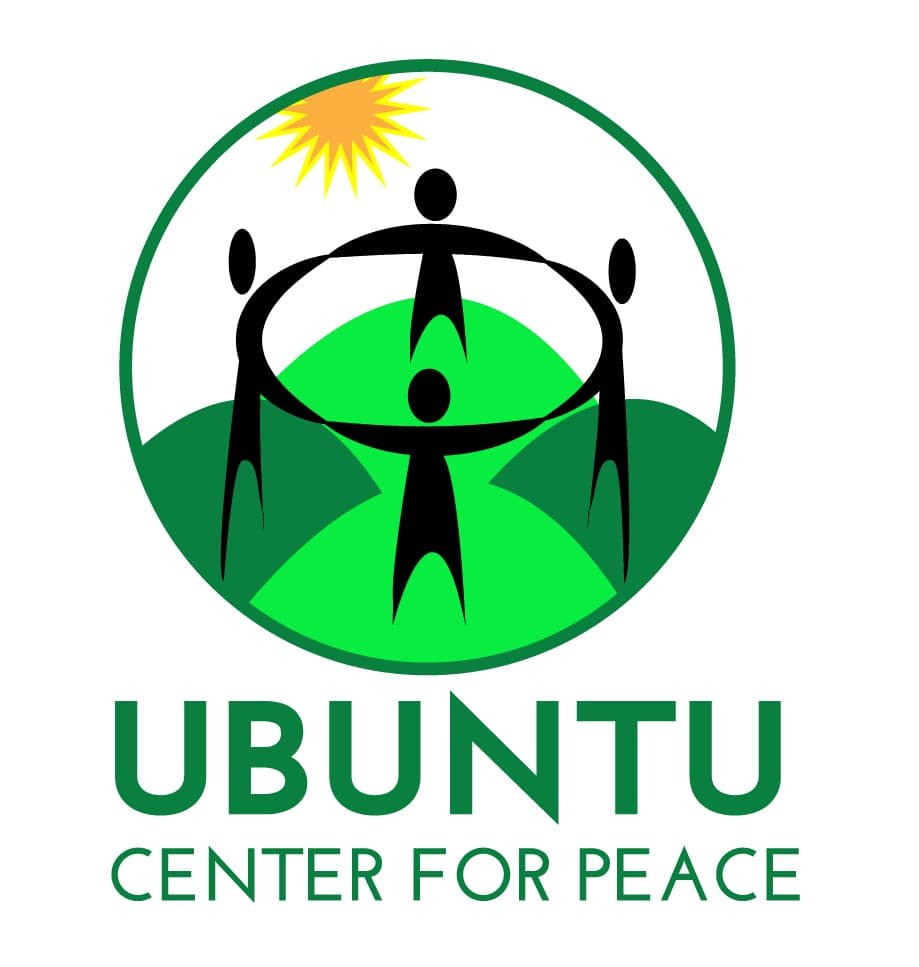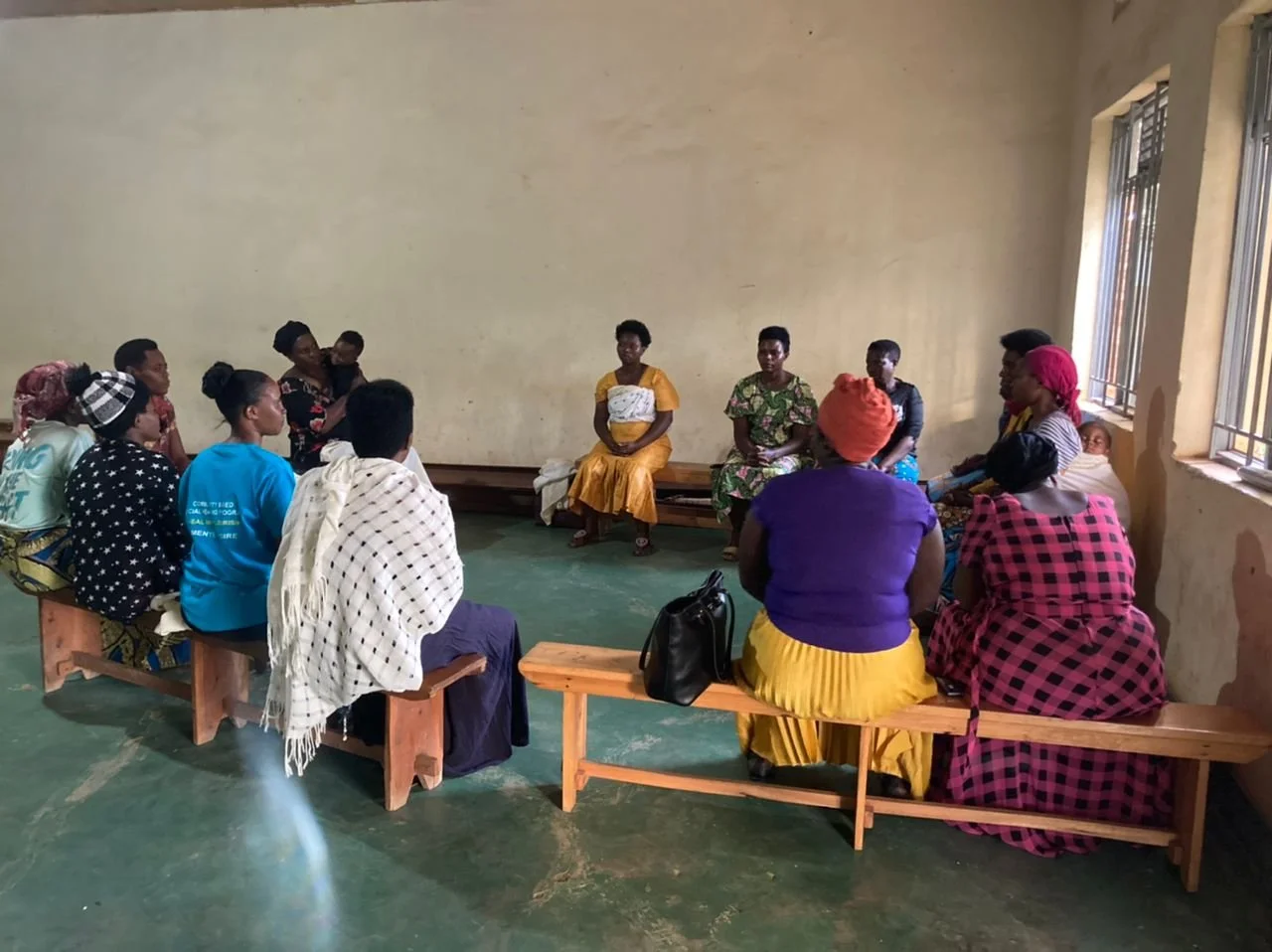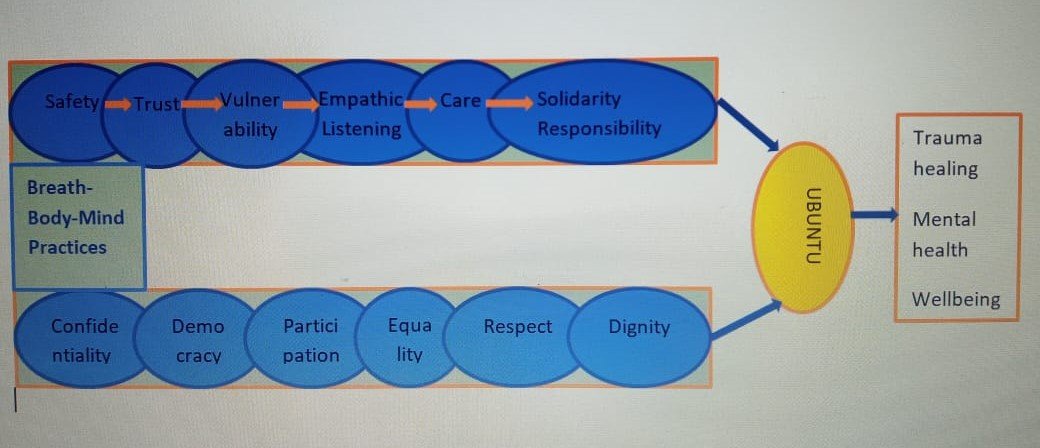Rebuilding Ubuntu to improve trauma healing, mental health and wellbeing in a traumatized society
Watch the excerpt from the interview of the Executive Director with Voice of America (VOA) on intergenerational trauma and Ubuntu:
“Violence destroys voice, the sense of belonging and place.” However, despite such a context, the Western therapeutic paradigm risks de-contextualizing trauma into an isolated medical model of disease and cure, ignoring that humans exist within “tribes, communities, and groups” with their history and socio-cultural conditions. Ubuntu Center for Peace is offering an Ubuntu-driven healing model as a complementary alternative.
In post-genocide Rwanda, 1 in 5 people in the general population and 1 in 2 people among genocide survivors live with trauma and mental conditions [1]. Most trauma symptoms have transformed over the years into other clinical manifestations including depression, anxiety, panic disorders, suicidality, aggression and substance abuse [2]. Most of them are associated with social problems inherited from genocide including chronic fear and mistrust, social isolation and discrimination, guilt, collective angst, victimhood and shame [3]. In addition, ex-prisoner genocide perpetrators face issues of social stigma, rejection by the family, compounded by loss of social and professional identity caused by a long period of incarceration, erosion of family relationships and emotional expression, and loss of hope in the future [3].
While 62% of those who need mental healthcare are aware of existing mental health services, only 5.3% utilize them, leaving 94.7% of those with mental health care needs not accessing services [1]. This highlights the services gap which is exacerbated by the cultural discomfort with conventional facility-based, individualised and often medicalised treatment modalities. Group solutions have proven successful in African context, because of collectivist components in culture. The Western paradigm has the risk to de-contextualize trauma into an isolated medical model of disease and cure, ignoring that humans exist within “tribes, communities, and groups”with their history and socio-cultural conditions [4, 18].
Ubuntu-driven healing model to address trauma and improve mental conditions and wellbeing
Ubuntu Center for Peace provides the community-based social healing model as an alternative healing model, which is Ubuntu-driven. Acknowledging the collective aspects of trauma creates healing spaces that engage participants to collectively address trauma through breath-body-mind practices integrated with collective narrative and rituals, in well-structured healing groups, facilitated by Community Healing Assistants. Beyond the treatment of pathologies, the Ubuntu-driven model fosters strengths and wellbeing through “humanness, interconnectedness and compassion.”
The Ubuntu-driven model resonates with the mental health and well-being socio-ecological model which considers six levels of influence on mental health including individual, relationships, organizations, communities, policy and society. This offers insights on how to tackle mental conditions holistically beyond conventional individualistic approaches [5], in line with the World Health Organization definition of health as “a state of complete physical, mental, and social well-being and not merely the absence of disease or infirmity.”
According to the African Journal of Social Work, Ubuntu is defined as a collection of values and practices that people of Africa or of African origin view as making people authentic human beings. While the nuances of these values and practices vary across different ethnic groups, they all point to one thing – an authentic individual human being is part of a larger and more significant relational, communal, societal, environmental and spiritual world [15]. It’s important to highlight the centrality of the relationships in Ubuntu philosophy as reflected in the Nguni proverb “umuntu ngumuntu ngabantu”, i.e. "a person is a person through other persons”.
The important role of the quality of relationships in the mental health conditions’ recovery is highlighted in many studies [16, 17], whether within a clinical setting, with a family member, a psychotherapist or a friend. The mechanisms associated with the healing in the context of social cooperation include empathy, emotional contagion, emotion regulation, compassion, and consoling behaviour in the form of interpersonal regulation of emotion, which reduce distress and restore social connections [8, 9, 10].
From the aforementioned, Ubuntu described as “the capacity in the African culture to show compassion, reciprocity, dignity, humanity, and mutuality in the interests of communality in light of justice and mutual caring” in clinical social work [11, 12, 13, 14], constitutes the central mechanism underlying psycho-social healing and improvement in mental health outcomes and well-being.
How community-based social healing model rebuilds Ubuntu in traumatized individuals and communities
The Community-based social healing model integrates breath-body-mind practices with collective narrative and rituals through Community Healing Assistants in therapeutic groups.
Breath-Body-Mind practices regulate emotions and heal by inhibiting the brain structures that lead to over-reactivity including fear and anger, anxiety, helplessness and hyper-vigilance and increasing activity in the brain’s higher center that mediates executive functions including decision-making and planning for the future. They increase awareness of inner feelings, emotions and thoughts by stimulating the brain interoceptive centers, hence helping in making choices with clarity. In addition, they stimulate neurophysiological processes that increase empathy, love and social engagement [9,10,19,20].
Rituals including dancing, singing, and drumming play an important role in creating a safe space for authentic safe engagement. Collective narrative in a safe space gives participants the power to re-author their stories, restore their sense of belonging, self-worth, meaning and purpose and hope for the future. Therapeutic group members’ stories influence or inspire one another in challenging unhealthy perspectives and perceptions and changing them into healthier ones. The innovation increases the social capital and group support which improves the power to tackle poverty.
A structured and scalable process that rebuilds Ubuntu
All the above is implemented through a well-structured process that first fosters safety and trust, then brings participants into vulnerability, empathic listening without judgment, mutual care and responsibility, and solidarity. This process is supported by agreed upon principles including confidentiality, democracy, equality, participation, respect and dignity.
UBUNTU here is characterized by humanness, interconnectedness and compassion
Conclusion
The community-based social healing model is an Ubuntu-driven model that considers the environmental context that caused harm. By fostering Ubuntu in participants, the improvement of Ubuntu proportionately predicts the improvement of trauma healing, mental health outcomes and well-being. Ubuntu Center for Peace is conducting a study to get more insights on how Ubuntu mediates the impact of the community-based social healing on trauma healing, mental health outcomes and wellbeing. More to come!
References
[1]. Kayiteshonga, Y., Sezibera,V.& Smith-Swintosky,V. (2019) Rwanda Mental Health Survey, Draft.
[2]. Rwanda Research Symposium 2022. Evidence-based Research Practices in the Field of Mental Health and Child Development: Presentation of Research Findings from InterPeace. Available at https://www.youtube.com/watch?v=OZfeJrvTUxs
[3]. Interpeace: new findings and protocols to improve mental health and social cohesion. September 24, 2021. Available at https://www.interpeace.org/2021/09/rwanda-new-findings-and-protocols-to-improve-mental-health-and-social-cohesion-in-rwanda/
[4]. Afana, A. (2012) Problems in Applying Diagnostic Concepts of PTSD and Trauma in the Middle East. The Arab Journal of Psychiatry, Vol. 23 supplement Page (28-34). Available from: https://pdfs.semanticscholar.org/eb46/b83833f713ee742108a6d8725bd7b3fd4c0a.pdf
[5]. University of Minnesota, Center for Leadership Education in Maternal & Child Public Health, School of Public Health. Mental Health and Wellbeing: A Socio-Ecological Model. Available at: https://mch.umn.edu/resources/mhecomodel/
[6]. Community-based Social Healing Model. Available at https://ubuntucenterforpeace.org/
[7]. Ubuntu Center for Peace: Impact Reports. Available at https://ubuntucenterforpeace.org/reports
[8]. Brandon A. Kohrt, A.B., Ottman, K., Panter-Brick, C., Konner, M., Patel,V.(2020) Why we heal: The evolution of psychological healing and implications for global mental health. Clinical Psychology Review 82 (2020) 101920, https://doi.org/10.1016/j.cpr.2020.101920
[9]. Gerbarg, P. L., Brown, R. P., Streeter, C. C., Katzman, M., Vermani, M. Breath Practices for Survivor and Caregiver Stress, Depression, and Post-traumatic Stress Disorder: Connection, Co-regulation, Compassion. Integrative and Complementary Medicine OBM, April 2019. 4(3):1-24. https://doi.org/10.21926/obm.icm.1903045
[10]. Brown, R. P., Gerbarg, P. L., Muench F. Breathing practices for treatment of psychiatric and stress-related medical conditions. In Complementary and Integrative Therapies for Psychiatric Disorders, Edited by Phillip R. Muskin, Patricia L. Gerbarg, and Richard P. Brown. Psychiatric Clinics of North America. March 2013, 36(1):121-140. http://doi: 10.1016/j.psc.2013.01.001.22.
[11]. Broodryk, J. (2008). Understanding South Africa: The ubuntu way of living. Pretoria: Ubuntu School of Philosophy. Cited by Chigangaidze,K.R. (2021) Defending the African philosophy of ubuntu and its place in clinical social work practice in mental health: The biopsychosocial and ecological systems perspectives, Social Work in Mental Health, 19:4, 276-288, https://doi.org/10.1080/15332985.2021.1910894
[12]. Khoza, R. (2006). Let Africa lead: African transformational leadership for 21st century business. Johannesburg: Vesubuntu Publishing. Cited by Chigangaidze,K.R. (2021) Defending the African philosophy of ubuntu and its place in clinical social work practice in mental health: The biopsychosocial and ecological systems perspectives, Social Work in Mental Health, 19:4, 276-288, https://doi.org/10.1080/15332985.2021.1910894
[13]. Mangaliso, M. (2001). Building competitive advantage from ubuntu: Management lessons from South Africa. Academy of Management Executive, 15(3), 23–34. Cited by Chigangaidze,K.R. (2021) Defending the African philosophy of ubuntu and its place in clinical social work practice in mental health: The biopsychosocial and ecological systems perspectives, Social Work in Mental Health, 19:4, 276-288, https://doi.org/10.1080/15332985.2021.1910894
[14]. Van Breda, A. (2019). Developing the notion of ubuntu as African theory for social work practice. Social Work/Maatskaplike Werk, 55(4), 439–450. https://doi.org/10.15270/55-4-762
[15]. Mugumbate, J.& Chereni, A. (2019) Now the theory of Ubuntu has its space in Social Work. African Journal of Social Work, 10(1), 2020
[16]. Schön, U., Denhov, A. and Topor, A. (2016)Social Relationships as a Decisive Factor in Recovering From Severe Mental Illness. Int J Soc Psychiatry 2009 55: 336. Available at DOI: 10.1177/0020764008093686
[17]. Chigangaidze,K.R. (2021) Defending the African philosophy of ubuntu and its place in clinical social work practice in mental health: The biopsychosocial and ecological systems perspectives, Social Work in Mental Health, 19:4, 276-288, https://doi.org/10.1080/15332985.2021.1910894
[18].Bobak, A. (2020) Decolonizing the Medical Model Approach to Trauma. Available at https://www.madinamerica.com/2022/09/decolonizing-medical-model-trauma/
[19]. Geisler FC, Kubiak T, Siewert K, Weber H. Cardiac vagal tone is associated with social engagement and self-regulation. Biol Psychol. 2013; 93: 279-286.
[20]. Porges SW, Carter CS. Polyvagal theory and the social engagement system. Neurophysiological bridge between connectedness and health. . In Complementary and Integrative Treatments in Psychiatric Practice, edited by Gerbarg PL, Brown RP and Muskin PR. Washington D.C., American Psychiatric Association Publishing, 2017, 221-240.


